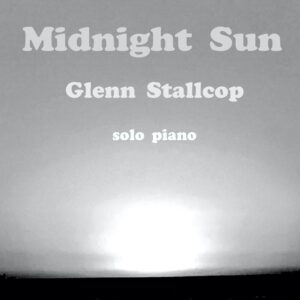Glenn Stallcop Composer, Performer


The polar magnet
I harbor a certain fascination with the Arctic. Growing up in Seattle, I became aware that Seattle was known as the “Gateway to the Final Frontier,” i.e., Alaska. The mother of the family I grew up playing with was an Aleut Native American, and five of the six children in that family moved to Alaska after school. I finally was able to see part of Alaska a few years ago when my wife and I took a week-long cruise up through the Inland Passage to Anchorage. It was stunningly beautiful and would have been even more so if the cloud cover would have lifted
I have read a number of stories about life in Alaska and what it is like to carve out a life there. I have a violinist colleague who spent thirty years in Fairbanks and is a constant source of Alaska stories. We had another friend who told of life in Whitehorse, Yukon. She said they wore shirtsleeves when the temperature rose above freezing and told of an exciting time floating down the Yukon River with the ice in the spring. The elements can be brutal in Alaska or anywhere in the Arctic, but there have always been people who enjoyed and preferred that sort of life.
However, there is nowhere that has been more dramatically affected by climate change than the Arctic. The Greenland Icecap is melting dozens of times faster than predicted. The polar icecap has receded dramatically in recent years, endangering the Polar Bear, of all things, which is pretty formidable in its own right. The receding ice has opened up the Arctic Ocean to shipping and put one of the last pristine ecosystems at imminent risk.
Climate change is also threatening to make some equatorial climates virtually unlivable forcing the migration of millions of people toward the poles and more hospitable habitats. The uprooting of whole populations would have mind-boggling consequences. Moving by choice is pioneering and full of hope, but to move from necessity is to be a refugee, which is a life of anguish and despair.
The Far North is beautiful and vast, and it is one in which we are not likely to forget our place in the natural order of things. Environmentalism is a passion, but living in nature is survival. Survival takes attention, understanding, and skill. It is not comfy; it is all-consuming and difficult. But even so, one can still bask in the midnight sun or gaze in wonder at the Aurora Borealis. Change can be bitter and cruel, but life is what it is, and better than the alternative.
THE POLAR MAGNET
I harbor a certain fascination with the Arctic. Growing up in Seattle, I became aware that Seattle was known as the “Gateway to the Final Frontier,” i.e., Alaska. The mother of the family I grew up playing with was an Aleut Native American, and five of the six children in that family moved to Alaska after school. I finally was able to see part of Alaska a few years ago when my wife and I took a week-long cruise up through the Inland Passage to Anchorage. It was stunningly beautiful and would have been even more so if the cloud cover would have lifted
I have read a number of stories about life in Alaska and what it is like to carve out a life there. I have a violinist colleague who spent thirty years in Fairbanks and is a constant source of Alaska stories. We had another friend who told of life in Whitehorse, Yukon. She said they wore shirtsleeves when the temperature rose above freezing and told of an exciting time floating down the Yukon River with the ice in the spring. The elements can be brutal in Alaska or anywhere in the Arctic, but there have always been people who enjoyed and preferred that sort of life.
However, there is nowhere that has been more dramatically affected by climate change than the Arctic. The Greenland Icecap is melting dozens of times faster than predicted. The polar icecap has receded dramatically in recent years, endangering the Polar Bear, of all things, which is pretty formidable in its own right. The receding ice has opened up the Arctic Ocean to shipping and put one of the last pristine ecosystems at imminent risk.
Climate change is also threatening to make some equatorial climates virtually unlivable forcing the migration of millions of people toward the poles and more hospitable habitats. The uprooting of whole populations would have mind-boggling consequences. Moving by choice is pioneering and full of hope, but to move from necessity is to be a refugee, which is a life of anguish and despair.
The Far North is beautiful and vast, and it is one in which we are not likely to forget our place in the natural order of things. Environmentalism is a passion, but living in nature is survival. Survival takes attention, understanding, and skill. It is not comfy; it is all-consuming and difficult. But even so, one can still bask in the midnight sun or gaze in wonder at the Aurora Borealis. Change can be bitter and cruel, but life is what it is, and better than the alternative.